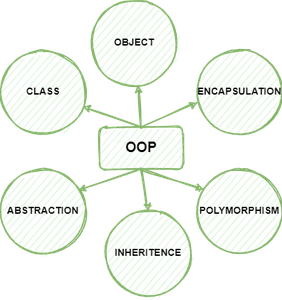En Python, la programación orientada a objetos (POO) es un paradigma de programación que utiliza objetos y clases en la programación. Su objetivo es implementar entidades del mundo real como herencia, polimorfismos, encapsulación, etc. en la programación. El concepto principal de los OOP es unir los datos y las funciones que trabajan en eso como una sola unidad para que ninguna otra parte del código pueda acceder a estos datos.
Conceptos principales de la programación orientada a objetos (POO)
- Clase
- Objetos
- Polimorfismo
- Encapsulación
- Herencia
- Abstracción de datos

Ups
Clase
Una clase es una colección de objetos. Una clase contiene los planos o el prototipo a partir del cual se crean los objetos. Es una entidad lógica que contiene algunos atributos y métodos.
Python
# Python3 program to # demonstrate defining # a class class Dog: pass
Python3
obj = Dog()
Python3
class Dog:
# class attribute
attr1 = "mammal"
# Instance attribute
def __init__(self, name):
self.name = name
# Driver code
# Object instantiation
Rodger = Dog("Rodger")
Tommy = Dog("Tommy")
# Accessing class attributes
print("Rodger is a {}".format(Rodger.__class__.attr1))
print("Tommy is also a {}".format(Tommy.__class__.attr1))
# Accessing instance attributes
print("My name is {}".format(Rodger.name))
print("My name is {}".format(Tommy.name))
Python3
class Dog:
# class attribute
attr1 = "mammal"
# Instance attribute
def __init__(self, name):
self.name = name
def speak(self):
print("My name is {}".format(self.name))
# Driver code
# Object instantiation
Rodger = Dog("Rodger")
Tommy = Dog("Tommy")
# Accessing class methods
Rodger.speak()
Tommy.speak()
Python3
# Python code to demonstrate how parent constructors
# are called.
# parent class
class Person(object):
# __init__ is known as the constructor
def __init__(self, name, idnumber):
self.name = name
self.idnumber = idnumber
def display(self):
print(self.name)
print(self.idnumber)
def details(self):
print("My name is {}".format(self.name))
print("IdNumber: {}".format(self.idnumber))
# child class
class Employee(Person):
def __init__(self, name, idnumber, salary, post):
self.salary = salary
self.post = post
# invoking the __init__ of the parent class
Person.__init__(self, name, idnumber)
def details(self):
print("My name is {}".format(self.name))
print("IdNumber: {}".format(self.idnumber))
print("Post: {}".format(self.post))
# creation of an object variable or an instance
a = Employee('Rahul', 886012, 200000, "Intern")
# calling a function of the class Person using
# its instance
a.display()
a.details()
Python3
class Bird:
def intro(self):
print("There are many types of birds.")
def flight(self):
print("Most of the birds can fly but some cannot.")
class sparrow(Bird):
def flight(self):
print("Sparrows can fly.")
class ostrich(Bird):
def flight(self):
print("Ostriches cannot fly.")
obj_bird = Bird()
obj_spr = sparrow()
obj_ost = ostrich()
obj_bird.intro()
obj_bird.flight()
obj_spr.intro()
obj_spr.flight()
obj_ost.intro()
obj_ost.flight()
Python3
# Python program to
# demonstrate private members
# Creating a Base class
class Base:
def __init__(self):
self.a = "GeeksforGeeks"
self.__c = "GeeksforGeeks"
# Creating a derived class
class Derived(Base):
def __init__(self):
# Calling constructor of
# Base class
Base.__init__(self)
print("Calling private member of base class: ")
print(self.__c)
# Driver code
obj1 = Base()
print(obj1.a)
# Uncommenting print(obj1.c) will
# raise an AttributeError
# Uncommenting obj2 = Derived() will
# also raise an AtrributeError as
# private member of base class
# is called inside derived class
Publicación traducida automáticamente
Artículo escrito por GeeksforGeeks-1 y traducido por Barcelona Geeks. The original can be accessed here. Licence: CCBY-SA